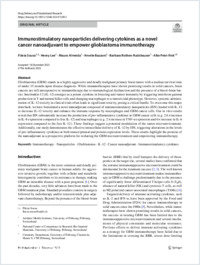Immunostimulatory nanoparticles delivering cytokines as a novel cancer nanoadjuvant to empower glioblastoma immunotherapy
DOKPE
- Sousa, Flávia ORCID Adolphe Merkle Institute, University of Fribourg, Fribourg, Switzerland
- Lee, Henry Adolphe Merkle Institute, University of Fribourg, Fribourg, Switzerland
- Almeida, Mauro ORCID Adolphe Merkle Institute, University of Fribourg, Fribourg, Switzerland
- Bazzoni, Amelie ORCID Adolphe Merkle Institute, University of Fribourg, Fribourg, Switzerland
- Rothen-Rutishauser, Barbara ORCID Adolphe Merkle Institute, University of Fribourg, Fribourg, Switzerland
- Fink, Alke ORCID Adolphe Merkle Institute, University of Fribourg, Fribourg, Switzerland and Chemistry Department, University of Fribourg, Chemin du Musée 9, 1700, Fribourg, Switzerland
- 31.12.2023
Published in:
- Drug Delivery and Translational Research. - Springer Science and Business Media LLC. - 2023
English
Glioblastoma (GBM) stands as a highly aggressive and deadly malignant primary brain tumor with a median survival time of under 15 months upon disease diagnosis. While immunotherapies have shown promising results in solid cancers, brain cancers are still unresponsive to immunotherapy due to immunological dysfunction and the presence of a blood–brain barrier. Interleukin-12 (IL-12) emerges as a potent cytokine in fostering anti-tumor immunity by triggering interferon-gamma production in T and natural killer cells and changing macrophages to a tumoricidal phenotype. However, systemic administration of IL-12 toxicity in clinical trials often leads to significant toxicity, posing a critical hurdle. To overcome this major drawback, we have formulated a novel nanoadjuvant composed of immunostimulatory nanoparticles (ISN) loaded with IL-12 to decrease IL-12 toxicity and enhance the immune response by macrophages and GBM cancer cells. Our in vitro results reveal that ISN substantially increase the production of pro-inflammatory cytokines in GBM cancer cells (e.g. 2.6 × increase in IL-8 expression compared to free IL-12) and macrophages (e.g. 2 × increase in TNF-α expression and 6 × increase in IL-6 expression compared to the free IL-12). These findings suggest a potential modulation of the tumor microenvironment. Additionally, our study demonstrates the effective intracellular delivery of IL-12 by ISN, triggering alterations in the levels of pro-inflammatory cytokines at both transcriptional and protein expression levels. These results highlight the promise of the nanoadjuvant as a prospective platform for resharing the GBM microenvironment and empowering immunotherapy.
- Faculty
- Faculté des sciences et de médecine
- Department
- NCCR - Bio-Inspired Materials, Département de Chimie, AMI - Bio-Nanomatériaux
- Language
-
- English
- Classification
- Pharmacology, therapeutics, toxicology
- License
- Open access status
- hybrid
- Identifiers
-
- DOI 10.1007/s13346-023-01509-2
- ISSN 2190-393X
- Persistent URL
- https://folia.unifr.ch/unifr/documents/327179
Statistics
Document views: 68
File downloads:
- publishedpaper: 298
